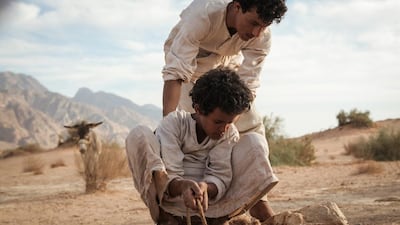Naji Abu Nowar's short film Death of a Boxer was screened at the Dubai International Film Festival in 2009, but the road from that to making his first feature film proved to be long and winding.
Along the way, there was a series of scripts that never got enough funding and ideas that floated off into the wind – but then he met the producer and co-screenwriter Bassel Ghandour.
“He wrote a short film in 2010, which he sent to me and I loved,” says Nowar, who lives and works in Jordan. “The first thing I wrote in 2003 was this kind of Bedouin Western, which wasn’t very good but I realised that this world was ripe for cinema.
“A little while later, I was in the desert and looking at the landscape and this idea suddenly clicked and I immediately called Bassel asking if he wanted to work together.”
The result of their collaboration is Theeb, which was developed by Sanad, the development and post-production fund of the Abu Dhabi Film Festival.
Theeb will premiere at the Venice Film Festival, which begins on August 27, and has been selected for the Orizzonti competition section of the programme, which is a breeding ground for new talent.
Set in Arabia in 1916, the film tells the story of two brothers living with a Bedouin tribe in a forgotten corner of the Ottoman Empire, an area that is now part of northern Saudi Arabia. After the death of their father, the elder boy, Hussein, tries to teach his brother Theeb (the Arabic word for wolf) about the Bedouin way of life.
Their lives are interrupted by the arrival of a British army officer and his guide, who are on a mysterious mission.
The writer and director says the film would not have been made without the generous help of the Jordanian film community.
“You need ambassadors who are going to take risks with you and people who are forward-thinking and believe that we can make films that can get into Venice,” says Nowar. “They are the unsung heroes of the film, as are the crew – a lot of whom worked for deferred payments or for free.
“Then there are funds such as Sanad. That was the only finance and support we got when we developed the screenplay. They also helped us out in post-production and stood by us throughout. Doha Film Institute also came in and were wonderful as well. They did a huge amount for us and it was great that these two institutions worked together and really cooperated to help us.”
Nowar was fascinated by the idea of making a film set in 1916 because “obviously, that period in history is a fundamental part of forming what is the modern Middle East, just in the fact that it was the end of the 400-year Ottoman Empire”.
He adds: “It’s a time of massive change, which I’ve always loved about American Westerns or Akira Kurosawa Easterns – where you see the building of railroads or the first person to handle a pistol. I love these kinds of things because they are really relevant to our world now. I’d like to claim credit that we knew the Arab Spring was coming, but we didn’t have a clue. But it must have been in the zeitgeist.”
Nowar was born in Oxford, England, and lived there until his family returned to Jordan when he was 10. He went back to England to sit his A Levels and, coming from a military family, he went on to pursue war studies at King’s College London. “You’d be surprised that, strategically and organisationally, I’ve used a lot of stuff that I was taught in filmmaking,” he says.
Nowar has been living in Amman since 2004, but for the majority of the writing and production of Theeb, he lived in Shakiriya Village in the Wadi Rum desert.
“The people of Wadi Rum are the single most important contributors to the film,” says Nowar. “Their folklore, their storytelling, their poetry is really what the film is about. The story developed by sitting around with the old men of the tribe and listening to their tales, picking up elements and things that excited me and I incorporated it into the story.”
His desire for the film to be as authentic and realistic as possible led Nowar to cast Wadi Rum residents, rather than professional actors, in many roles.
“For me it was really important that we film as authentically as we could,” he says. “The Bedouin in the region and from the village are pretty much the last Bedouin to be settled. All the adult males have spent a part of their childhood living as nomadic Bedouin.
“We wanted to go there because they knew that way of life, they knew how to track and all the things that Bedouin from that period would have known, so apart from the English actor and a few other cast members who play Ottomans, everyone was from that community.”
The attention to detail has clearly paid off, as Nowar reveals that, so far, nine film festivals have accepted Theeb.
• The Venice Film Festival runs from August 27 until September 6
artslife@thenational.ae


